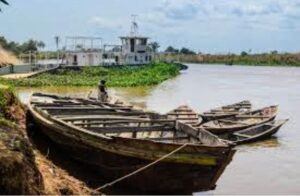

By correspondent in Lokoja.

Photo credit: Google.
The Managing Director of the Nigeria Inland Waterways Authority (NIWA), Bola Oyebamiji, has disclosed that many operators of commercial boats and canoes in Nigeria are under the influence of drugs and chemical substances to enhance their performance.
Oyebamiji made this revelation on Wednesday during a visit by members of the Federal House of Representatives Committee on Inland Waterways to NIWA’s headquarters in Lokoja.
According to Oyebamiji, human errors, including the use of substandard boats, overloading, and nighttime operations, are the primary causes of boat and canoe accidents in Nigeria.
He said:”Ninety percent of boat accidents in Nigeria are caused by human errors. Unfortunately, most commercial boat and canoe operators rely on drugs and chemical substances to enhance performance.
“These operators frequently overload their vessels, carrying up to 200 passengers in boats meant for just 60. They also operate between 9 p.m. and 2 a.m., well beyond our official patrol hours of 6 a.m. to 6 p.m.”
The said that to address these challenges, NIWA has employed 350 Water Marshals to conduct 24-hour patrols on the waterways.
Oyebamijia added the Authority has partnered with the National Drug Law Enforcement Agency (NDLEA) to curb drug use among operators.
He emphasized the agency’s commitment to ensuring passenger safety by distributing life jackets, conducting safety campaigns in coastal communities, and equipping passengers with emergency preparedness knowledge.
The NIWA MD also called for an update to the Nigerian Transportation Code, pointing out that l it relates to water transportation to further enhance passenger safety and promote the attractiveness of water transport.
He appealed for increased funding to enable NIWA fulfill its mandate effectively.
The Chairman of the Federal House of Representatives Committee on Inland Waterways, Dr. Ojema Ojotu, commended NIWA’s efforts in ensuring safe water transportation.
He pledged the committee’s continued support and stressed the need for innovative financing mechanisms to supplement government funding.
“It is clear that traditional funding models may not suffice to meet NIWA’s infrastructure and capacity-building needs,”
“We must explore alternative financing options, including public-private partnerships, concessional arrangements, and other innovative funding mechanisms to bridge the gaps and drive impactful development,”Ojotu said.
Edited by Dada Ahmed.
,


